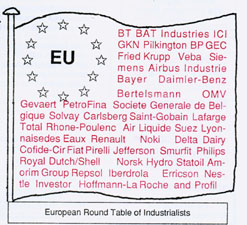Democrat - Front page - September-October 1998 (Issue No. 32)
Social Partnership gags trade unions

The Social Partnership advocated for employers and
trade unions can be likened to a pack of hungry wolves inviting a
flock of ducks to sit at the dinner table.
An examination of who is behind this apparently benign
relationship reveals the little known European Round Table of Industrialists
formed in 1983 with the help of European Commissioners. The ERT consists
of the largest 46 transnational corporations in the European Community.
They include Shell, BP, GEC and BT.
RT influence over the EC led to their reports being
used to set up the Internal Market and the Single European Act which
consolidated the thrust to European Union with a single currency specified
in the Treaty on European Union (Maastricht).
The ERT pressed for, and won, an expansion of the
Euro-infrastructure including the Channel Tunnel and Trans-European
Networks (TENS) with hundreds of miles of new roads and motorways.
A Competitiveness Advisory Group was set up by Commission
President Santer in 1995. In 1997 he appointed three representatives
of ERT corporations, three other corporate interests and three trade
unionists to the CAG. Representatives from the ETUC were now part
and parcel of a "Europe" run for corporate interests. This is part
of the social partnership in practice where decisions taken at the
EU level are passed back down a conduit to national TUCs and trade
unions. The effect is to draw trade unions and those who work into
a corporate state run by Brussels.
The ERT demanded "employee flexibility" in the labour
market and removal of legislation which protected workers. The ERT
in 1993 stated "labour costs are the single major cause of falling
competitiveness" where wages and corporate taxes must be cut and
productivity raised.
These objectives of more "flexibility" and "competitiveness"
are mouthed repeatedly by Euro-politicians and Government ministers
to workers in the name of jobs.
The ERT introduced "benchmarks" which takes lowest
costs, and wages, across the world as standard practice.
All this is the hidden background which makes clear
why anti-trade union laws have not been repealed by the current Labour
Government. European Works Councils have no powers to negotiate and
play no role in decisions of the relevant corporation and are to gag
trade unions.
For those who work there is no future in taking part
in a corporate state, they should press their organisations to:-
* Reject the Social Partnership;
* Reject flexibility in the labour market;
* Campaign to have anti-trade union laws repealed;
* Demand the Government run Britain on behalf of
people instead of transnational corporations, profits and competetiveness.
Also see European Round Table of Industrialists
and BusinessEurope (Confederation of European Business)